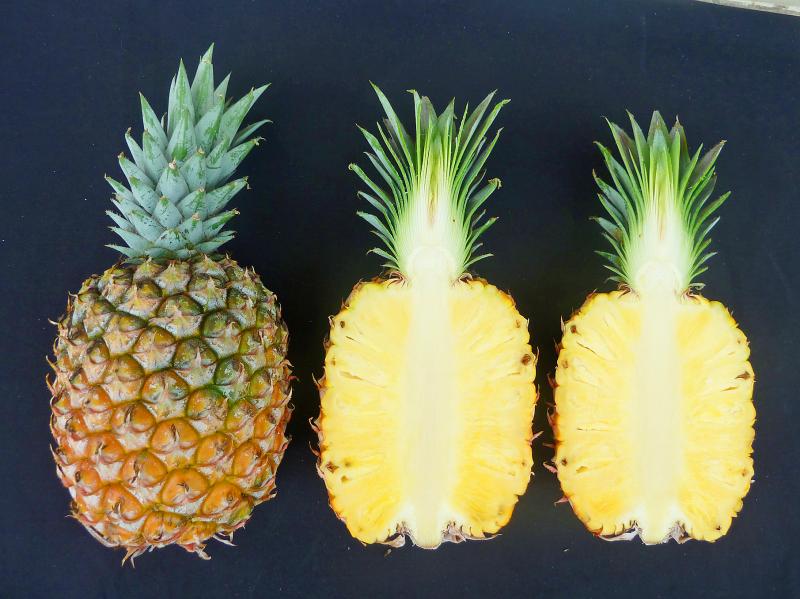The Taiwan Agricultural Research Institute has received temporary intellectual property protection for a new pineapple variety it developed in 2019, after registering the cultivar with the Japanese Ministry of Agriculture, Forestry and Fisheries last year, the institute said on Tuesday.
The new variety, named Tainung No. 23, was developed by the institute’s Chiayi Agricultural Experiment Station, which has introduced 18 different pineapple varieties in Taiwan since 1934, beginning with Tainung No. 1.
The institute on Oct. 18 last year registered the pineapple with the Japanese ministry for intellectual property protection in the Japanese market, it said.

Photo courtesy of the Taiwan Agricultural Research Institute
The ministry on May 6 granted Tainung No. 23 temporary protection, the institute said, adding that further evaluation is to be conducted in Japan before deciding on full protection.
Intellectual property registration of new agricultural products prevents other vendors from marketing the new varieties as their own.
Tainung No. 23 has a mango fragrance, delicate taste and no apparent fibers, the institute said, adding that the variety has a long shelf life, making it suitable for export.
Japan has become the leading destination for exports of Taiwanese pineapples, after China banned imports of the Taiwanese fruit in February last year.
Of the 28,664 tonnes exported from Taiwan last year, 17,850 tonnes — 62.3 percent — went to Japan, Council of Agriculture statistics show.
China imported 50,168 tonnes of pineapples from Taiwan in 2019, and 41,661 tonnes in 2020.

The Grand Hotel Taipei on Saturday confirmed that its information system had been illegally accessed and expressed its deepest apologies for the concern it has caused its customers, adding that the issue is being investigated by the Ministry of Justice Investigation Bureau. The hotel said that on Tuesday last week, it had discovered an external illegal intrusion into its information system. An initial digital forensic investigation confirmed that parts of the system had been accessed, it said, adding that the possibility that some customer data were stolen and leaked could not be ruled out. The actual scope and content of the affected data

‘LIKE-MINDED PARTNER’: Tako van Popta said it would be inappropriate to delay signing the deal with Taiwan because of China, adding he would promote the issue Canadian senators have stressed Taiwan’s importance for international trade and expressed enthusiasm for ensuring the Taiwan-Canada trade cooperation framework agreement is implemented this year. Representative to Canada Harry Tseng (曾厚仁) in an interview with the Central News Agency (CNA) said he was increasingly uneasy about Ottawa’s delays in signing the agreement, especially as Ottawa has warmed toward Beijing. There are “no negotiations left. Not only [is it] initialed, we have three versions of the text ready: English, French and Mandarin,” Tseng said. “That tells you how close we are to the final signature.” Tseng said that he hoped Canadian Prime Minister Mark Carney

POSITIVE DEVELOPMENT: Japan and the US are expected to hold in-depth discussions on Taiwan-related issues during the meeting next month, Japanese sources said The holding of a Japan-US leaders’ meeting ahead of US President Donald Trump’s visit to China is positive news for Taiwan, former Japan-Taiwan Exchange Association representative Hiroyasu Izumi said yesterday. After the Liberal Democratic Party’s landslide victory in Japan’s House of Representatives election, Japanese Prime Minister Sanae Takaichi is scheduled to visit the US next month, where she is to meet with Trump ahead of the US president’s planned visit to China from March 31 to April 2 for a meeting with Chinese President Xi Jinping (習近平). Japan and the US are expected to hold in-depth discussions on Taiwan-related issues during the

President William Lai (賴清德) yesterday bestowed one of Taiwan’s highest honors on Saint Vincent and the Grenadines (SVG) Ambassador Andrea Clare Bowman in recognition of her contributions to bilateral ties. “By conferring the Order of Brilliant Star with Grand Cordon on Ambassador Bowman today, I want to sincerely thank her, on behalf of the Taiwanese people, for her outstanding contribution to deepening diplomatic ties between Taiwan and SVG,” Lai said at a ceremony held at the Presidential Office in Taipei. He noted that Bowman became SVG’s first ambassador to Taiwan in 2019 and